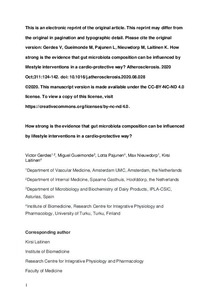How strong is the evidence that gut microbiota composition can be influenced by lifestyle interventions in a cardio-protective way?
Gueimonde Miguel; Laitinen Kirsi; Nieuwdorp Max; Gerdes Victor; Pajunen Lotta
How strong is the evidence that gut microbiota composition can be influenced by lifestyle interventions in a cardio-protective way?
Gueimonde Miguel
Laitinen Kirsi
Nieuwdorp Max
Gerdes Victor
Pajunen Lotta
Elsevier
Julkaisun pysyvä osoite on:
https://urn.fi/URN:NBN:fi-fe2021042822026
https://urn.fi/URN:NBN:fi-fe2021042822026
Tiivistelmä
Alterations in composition and function of the gut microbiota have been demonstrated in diseases involving the cardiovascular system, particularly coronary heart disease and atherosclerosis. The data are still limited but the typical altered genera include Roseburia and Faecalibacterium. Plausible mechanisms by which microbiota may mediate cardio-protective effects have been postulated, including the production of metabolites like trimethylamine (TMA), as well as immunomodulatory functions. This raises the question of whether it is possible to modify the gut microbiota by lifestyle interventions and thereby improve cardiovascular health. Nevertheless, lifestyle intervention studies that have involved modifications of dietary intake and/or physical activity, as well as investigating changes in the gut microbiota and subsequent modifications of the cardioprotective markers, are still scarce, and the results have been inconclusive. Current evidence points to benefits of consuming high-fibre foods, nuts and an overall healthy dietary pattern to achieve beneficial effects on both gut microbiota and serum cardiovascular markers, primarily lipids. The relationship between physical exercise and gut microbiota is probably complex and may be dependent on the intensity of exercise. In this article, we review the available evidence on lifestyle, specifically diet, physical activity and smoking as modifiers of the gut microbiota, and subsequently as modifiers of serum cardiovascular health markers. We have attempted to elucidate the plausible mechanisms and further critically appraise the caveats and gaps in the research.
Kokoelmat
- Rinnakkaistallenteet [19204]
